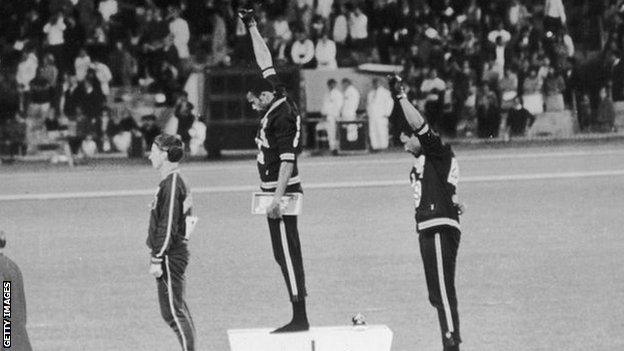Tokyo 2020: IOC relaxes protest rules for Olympics
- Published

At the 1968 Olympics, American athletes Tommie Smith and John Carlos protested on the podium against the ongoing civil rights issues in the USA at the time. Australia's Peter Norman, left, wore an Olympic Project for Human Rights badge in support of Smith and Carlos
Rules around athletes protesting at Tokyo 2020 have been relaxed by the International Olympic Committee (IOC).
Athletes will be able to "express their views" before and after competing but cannot do so during events, victory ceremonies and at the Olympic Village.
Any gesture cannot be "targeted, directly or indirectly, against people, countries, organisations and/or their dignity".
It means athletes can take the knee before an event.
They can also "express their views" when speaking to the media, during news conferences and on social media.
However, any protest is not allowed to be "disruptive", including unfurling a flag or banner during "the introduction of another athlete or team".
"The new guidelines are a result of our extensive consultation with the global athletes' community," said Kirsty Coventry, chair of the IOC's athletes commission.
"While the guidelines offer new opportunities for athletes to express themselves prior to the competition, they preserve the competitions on the field of play, the ceremonies, the victory ceremonies and the Olympic Village.
"This was the wish of a big majority of athletes in our global consultation."
The IOC said, external the consultation process "started in June 2020 and involved over 3,500 athletes representing 185 different NOCs (National Olympic Committees) and all 41 Olympic sports, and ensured fully gender-equal representation".